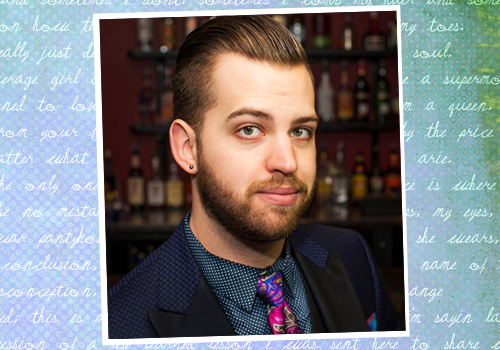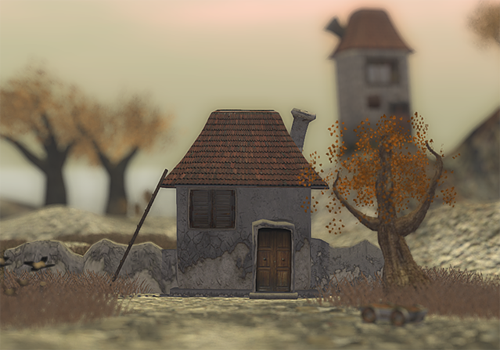Chris Baty's Blog, page 141
August 5, 2016
4 Ways to Ground Your Fantasy Novel

Writers often dabble in the surreal, especially when writing fantasy or science fiction. We asked a few writers to share how they approach creating magical worlds. Today, Zanzibar 7, writer and participant, shares four tips to ground your flights of fancy:
Writing fantasy should be the easiest of all genres. You can write almost anything and it can be believed—simply because you wrote it. But there can be a line between believable fantasy and fantasy that is too absurd for belief.
The late, amazing Sir Terry Pratchett wrote about a world in the shape of a disc, carried on the back of four elephants who are carried on the back of a giant turtle. It’s absurd in the highest, but Pratchett turns this mytheme on its head by using odd twists to somehow make the entire premise more believable, not less.
So what is it that takes something absurd and surreal and makes it believable? When I’m writing humor, I do the following:
Create a world where such absurdity is possible (if highly improbable).If the world itself encourages a suspension of belief in, say, standard physics, readers will be predisposed to believe the improbable. If I suddenly dump a unicorn into the middle of New York City without setting up the premise, I’m making my readers do some of the heavy lifting… and that’s hardly fair. I’m the writer. Carrying the burden of creation should be on me.
Believe in what you’re creating, at least within the confines of your story.I’m not really a believer in reincarnation, but one of my characters believes in it. Within that framework, I absolutely believe he reincarnates… so he does. Readers can believe it because I do.
Invest in the absurdity fully.There’s nothing worse to me, as a reader, than watching a writer toy around the edges of the surreal. When you do this, you end up with a child’s art project; if you throw yourself into the absurd, you might end up with a Picasso.
Yes, the eyes are in weird places and looking at it may send your mind to troubling places, but there is an unmistakable face in the madness.
Include a twist of reality.Remember Terry Pratchett? By using absurd but relatable facets (such as cats lording over humans) in his books, he makes the rest of his world more real.
Writing the surreal isn’t for the faint of heart, or the half-committed. It takes a lot of courage to jump off a cliff when you can’t see the invisible net waiting to catch you. But if you keep your absurd moments possible, invest in them fully, and anchor them in reality, you’ll write the kind of strangeness that gets readers in line for more.

Zanzibar 7. Schwarznegger is a fictional Figment-Writer who escaped through a plot hole into the real world. He resides somewhere in the Pacific Northwest and moves frequently under the Character Witness Relocation Program. His hobbies include oxymoron acrostics, weekend adverbial warfare, and braving the terrors of parody flux on a dare.
Top photo by Flickr user brlmk.
August 2, 2016
Wrimos Around the World: “Life Can Be Wondrously Fun”

One of the best parts of NaNoWriMo is the incredible community of writers behind it. Today, Cody Melcher, writer, stand-up comic, and host of the podcast Tomefoolery , shares his creative journey, and why fear can be an important part of the productive creative’s process :
What drew you to NaNoWriMo? Did its emphasis on unfiltered, uncensored creativity resonate with you?
I first heard about and got involved with NaNoWriMo in college. When I was young, I wanted to be a writer. I was a member of my school’s writing club in elementary school, I used to start and never finish elaborate space operas in middle school, and in high school I was a part of a local writers’ group at a Barnes & Noble in Houston.
It was something I really wanted to do, but a lot of personal things sort of took over my life at a certain point and my studies in school took away the rest of my time. At the time I heard about NaNoWriMo, I was trying to get my ducks in a row and my eggs in several baskets and I really connected to the idea. When it comes to non-standup writing, I’ve always been too obsessed with outlines. I write outlines out in my head and get really caught-up in having—essentially—a whole draft of something written in my head before I even put it to paper. I had had dreams of publishing a book before college, but I kept paralyzing myself before I could ever write one. Nothing was ever good enough.
NaNoWriMo came along and it seemed like such a perfect way to jump in and see if I could actually do it. To just write. And, as a goal-oriented person, the goal wasn’t to write a book, it was just to write the words needed to complete the challenge. They didn’t need a perfect first draft of a novel at the end, and that took so much pressure off of me.
I love your flair with underrepresented words! You describe yourself as a “witwanton” and a “Gentleman Radicalist.” You also make a reference to “finishing schools” in one of your stand-up shows. Do you find yourself in two worlds (old-fashioned aesthetics and iconoclast rebelliousness)?
I actually haven’t really thought of it in such directly concrete terms, but yeah, I guess I do in some way. I was very prim and proper growing up—obsessed with the concept of “Britishness” as an American tends to view it, and I loved the idea of that sort of Victorian style of manners as well as dress. I was raised pretty posh in terms of Americans as part of an old Southern family in Texas that attended a lot of gala events, so the gentleman thing was instilled in me when I was young, but I also really burrowed into it in the way that a kid does—that sort of surface-level way. I wore a bowler hat in middle school.
As I got older and the whole being queer thing started to be more of a part of my inner life, I started trying to find a place for myself, and I also got into the punk scene a bit. I always sort of thought of myself as a punk-punk—rebelling against the punk scene, which was pretty aggressively heteronormative and not at all interested in suits. I hadn’t yet discovered queercore, which came about in late high school and college for me.
I used to call myself an “Eccentric Gentleman”,which was on my business cards from middle school through college and into my professional life (case-in-point, I had business cards in middle school). “Gentleman Radicalist” came about as a replacement term because I felt that “Eccentric Gentleman” was an expression of what I am, but I wanted to express who I am.
I never really felt like I had a capital-T Tribe growing up—a group of friends, a pack, a club or place of belonging—I sort of wandered in and out of different music styles, television shows, book genres, and eventually just had to figure out who I am on my own through trial and error. I mean, I’m still figuring myself out and I’m constantly trying to find new and radically different things to be into it.
I can’t help but love your podcast “Tomefoolery.” What gave you the idea for a podcast that’s essentially a book club for crazy literature?
In early 2012, I had recently moved to Chicago and was taking classes at Second City, Annoyance, iO, anywhere I could. I’d had a failed podcast and improv troupe, was moving away from improv and into stand-up, and was desperate to do things.
A new friend of mine from one of my classes at Second City—Ranjit Souri (who is one of the funniest and most fantastic people you’ll ever meet—check out his group Siblings of Doctors if you ever get the chance) approached me about doing a podcast together. His initial idea was something with books, which I was all for. I thought we should do a more narrowband concept, since there are so many podcasts out there, you have to differentiate yourself somehow.
I had majored in Rhetoric at The University of Texas in Austin and had the absolute luck and joy of studying under Professor Trish Roberts-Miller in her Rhetoric of Demagoguery class. Trish and this class, honestly, is one of the biggest influences on my entire career moving forward. I had become obsessed with ideas—and books specifically—which were being put out into the world in sort of horrible ways. It was like watching a car crash, but a car crash you could warn people about and laugh about later (that makes no sense, I know). I suggested we should do a podcast about “weird and effed-up books”, with our first episode on Edgar Allen Poe’s only (racist) novel; the rest was history.
You’re tackling so many different projects, including your work as a stand-up. Has writing prep tied into creating your comedy?
I think the biggest lesson of NaNoWriMo that affected my stand-up—and really helped me in all aspects of my life—was to let myself breathe a little and be more spontaneous. When I write my stand-up, usually a premise comes to mind and then I’ll sort of follow a few tendrils of possible outcomes.
A lot of the time, I’ll take the premise, have an idea of where I want to go, then just jump on stage with it a few times and just run until I reach the end; I think that’s informed a lot by the concept behind NaNoWriMo. There is no right or wrong, only through. As long as I’m having fun, the audience is having fun, and the material will be, you know, fun.
As someone with so many balls in the air, could you reveal one multitasking secret of Cody Melcher?
I’m going to cheat, but because I think there’s not really one key answer here, and also because the first one which came to my mind was not uplifting necessarily. I will say Fear, Scheduling, and Fun.
Fear was what first came to my mind, because a lot of my life is driven by it, but I attempt to harness it. I don’t want to fail myself or others, and so I get things done because they need to get done. Fear isn’t always the best motivator, though, because it can cripple (which is why I’m terrible at responding to emails—they just come back if you answer them! It never ends!).
Scheduling is incredibly important and not just for the purposes of a calendar. Scheduling is more than a to-do list: it’s giving yourself realistic goals and realistic time limits for accomplishing them. It’s also prioritizing and giving yourself a buffer so that if important or unexpected things come up, you’re not overwhelmed or thrown off (again, something I’m still mastering).
Fun is something I’ve been trying to work on more and more. You can and will burn out. No one can last forever, and the people who claim they can are running on a tightrope. It’s a great trick and everyone’s impressed, but it’s dangerous and not guaranteed to end well. I work pretty much all the time I’m awake, but I’ve been trying to dedicate more time to not working. My New Year’s resolution last year was to take a day off from working every week (I failed miserably, but I fell like a shooting star of hope).
You need to take care of yourself, because even if you can work 24/7, a lot of that work won’t be as good as it could have been if you were rested and calm and happy—and also, you’re a human person, find some time to enjoy your life. I will also say that, for creative work, you need to experience life and drink deep of the world around and within you. You can’t be influenced by your alarm clock and your desperate determination to finish everything as quickly as possible. Sometimes, you know, life can be wondrously fun.
Do you have another creative endeavor stewing that you are willing to share? How have you motivated yourself to get started on it?
Oh, man, I have too many things. As of right now, I run a semi-monthly podcast, a weekly standup showcase, a comedy festival, I do standup, I’m in a sketch duo which is currently in a show run, I have a one-man show about politics in October, a play I wrote and am producing in November, and a nonfiction book I’m working on for next year. I’m also trying to get a webseries, a blog about wrestling fashion, and another podcast off the ground—but I’m trying not to overexert myself.
As for stewing projects, I’m going to open up my list of big projects that I can’t work on yet (because I’m trying to be realistic this year). They are: a novel, a one-man show about President James Garfield and fame, two film scripts, and three television pilots. I feel tired already.
In terms of getting motivated to get started on the ones I am definitely doing this year, it was just a matter of “No one else is going to do this for me”. I have a lot of great people I work with, but in a lot of my projects, I tend to work solo or at least tend to grab the baton a lot, and it’s because of that Fear thing I talked about earlier. I never want to feel like I’m just letting life slip by while I’m not at least trying to take hold of the reins. Some have called me a control freak, and sadly that’s probably true, but that’s also why I work alone a lot. It has to get done, and by hell or high water, if I have to be the one to do it, it’s going to get done. Also, you know, they’re fun sometimes. After they’re done and I can finally relax.
Cody Melcher is a witwanton and literary gentleman who weaves a tapestry of obscure observations and personal proclivities designed to delight and enlighten. Based in Chicago, he is the producer of 100 Proof Comedy at CSz Chicago, half of the celebrated sketch duo Melcher & Hauser, Editor in Chief of wrestling fashion blog Bespokeslam, and host of the critically-acclaimed podcast Tomefoolery.
Interview conducted by Madeleine Flamiano.
July 29, 2016
Camp Pep: How to Go Full Speed Ahead with Your Story

Camp NaNoWriMo is nothing without you, our incredible participants. Today, Grant Faulkner, our executive director reminds us why “But wait…” can be insidious:
Dear Intrepid Writer,
Lately I’ve been afflicted by a creature I call my Inner Editor’s cousin. In some ways, he is even more dangerous than my Inner Editor. He tends to walk around the rooms of my mind gazing at all of the imaginative ruckus with a persnickety, stuffy gaze. He exudes an air of judicious logic, speaking in the grave tones of seasoned caution (and, yes, he likes to wear ascots). He strolls in when I get an idea that I’m about to pounce on, and he says, “But wait…”
“But wait, this just isn’t logical.”
“But wait, this is preposterous.”
“But wait, no one would ever do that.”
I think of But Wait as an unenthusiastic drip. He’s the kind of person who never quite gets behind an idea—the killjoy who lacks the oomph or the wonderful reckless zealousness that makes ideas come to life.
When I feel too many But Waits in my mind, I try to embrace the opposite force, the guiding principle of improv acting (and NaNoWriMo, you might say): “Say, ‘Yes, and…’”
It’s simple, really. Improv actors are trained to trust the impulsive force of an idea and just say yes to it. They accept whatever their fellow actors offer in a scene instead of stiff-arming the action in the direction they want it to go. Improvisers take risks and make mistakes by definition. They let themselves fall into the most foolish behavior and allow themselves to speak what’s taboo—because that’s what leads them in fresh directions and helps them connect with their audiences.
I first discovered improvisational writing during NaNoWriMo’s word sprints. If you’re not familiar with them, word sprints challenge writers to write as fast as possible during a set time limit, often with a prompt to get them started. You can do them with a group—with @NaNoWordSprints on Twitter, during one of our Virtual Write-Ins—or even privately. Just give yourself a prompt, set a limit of five or 10 minutes, and go.
As the clock is ticking, it’s important not to hesitate. A word sprint invites you to turn off judgments by entering the flow of intuition that high-velocity writing taps into. If improv actors pause before jumping into a scene, it shows they are planning what’s to come, or even pausing because of a hindering social norm (that’s when But Wait loves to enter the scene). The purpose is to just go.
Don’t worry about tripping on something foolish when you write. Trip on a banana peel. Trip on a plot point. Trip on a character description, a line of dialogue, a single extravagant word. I find that the more improvisational I am, the more likely I am to chase bolder angles and discover unexpected plot developments and surprising character pivots. The only hazard? Many a main character has been dramatically punished as a result—and I tend to overuse dashes.
Join me in this final writing stretch by saying a big yes to each new idea, and follow all of those wonderful ‘and’s to the Camp finish line.
Yes!
Grant Faulkner
NaNoWriMo Executive Director

As a boy, Grant spent his allowance on all sorts of pens and paper, so there was never much question that he would become a writer. He’s also the founder of the lit journal 100 Word Story. He believes quite simply that everyone is a writer—that we create our world through the stories we tell—so he enthusiastically prods everyone he meets to write a novel and discover how life can be transformed through a daring creative act.
Top photo by Flickr user Bob MacInnes.
July 27, 2016
"Science has proven that music enhances the mind’s ability to function. The best music for..."
When you’re in a final stretch of a project, writing with music in the background beats silence. You can’t guarantee silence so if you have it, and it’s disrupted, it can be hard to refocus. On the other hand, music can trump any distracting sounds and even act as motivational fuel, just like a catchy uptempo song inspires you to run that extra mile.”
-
Sofia Quintero is a writer, activist, educator, speaker, and comedienne. She is also the author of Efrain’s Secret and has written several hip-hop novels under the pen name Black Artemis.
Writer’s Care Packages from Camp NaNoWriMo and We Need Diverse Books.
July 22, 2016
Camp Pep: Emerging from Doubt

Camp NaNoWriMo is nothing without you, our incredible participants. Today, Sarra Cannon, bestselling author and Camp participant, tells us why doubt is just a part of the writing process:
Let me tell you a story. A true one. Tell me if you recognize it.
The other day, I walked into my bedroom and collapsed on top of the bed, ignoring the heaps of folded clothes that covered its surface. “I give up,” I said.
“Let me guess,” my husband said. “This is the worst book you’ve ever written in your life.”
I sat up and frowned. How did he know what I was going to say? “Yes. This book sucks. I mean, it completely sucks. I hate every word. I don’t know what I’m going to do.”
Instead of hugging me and telling me it was going to be okay, my husband smiled and folded another shirt.
“What?” I asked, crossing my arms like a petulant child. “Why are you smiling?”
He looked up, his eyes full of love and understanding. “Because you do this every single time,” he said.
“I do?” I shook my head, not believing him.
“Every single project. You hit the middle, the writing gets harder, and you convince yourself you’re the worst writer of all time,” he said. “And every time you push through and realize you were wrong.”
“But what if it’s really true this time?” I asked, tears in my eyes. “What if it’s really terrible?”
He smiled again, the way only someone who’s lived with a writer for a decade can. “You say that every time, too,” he said. “And it’s never been true. Your book doesn’t suck. Everything is going to be okay. Just keep writing.”
This has become a cycle in my writing. It’s a part of my process, and I’ve come to trust it. My husband’s words have become my mantra, and I repeat them to myself when I hit a rough patch.
Your book doesn’t suck. Everything is going to be okay. Just keep writing.
No matter what you’re working on for Camp this year, you’re bound to hit a point somewhere in the middle of the whole thing where you start to doubt yourself. You may doubt your voice or your vision or your talent. You may doubt whether you have any business writing at all, and the only thing you want to do is bury your head in a stack of clean laundry and declare yourself the Worst. Writer. Ever.
If you’re like me and you’re hitting that point right about now, keep going. Don’t believe those voices of doubt that tell you you can’t do this or that you suck. Trust me. Doubt is part of the process. It’s like some mythical swamp of no hope we all must trudge through in order to get to the end.
The end always comes for me as this shining moment of triumph, my body covered in mud and my eyes lifted toward the sun. And my husband is inevitably right. The book is never as bad as I thought it would be. Some parts are even pretty darn good. I just couldn’t see it when I was in the thick of it.
If you’re going through the swamp right now and can’t see a way out, just keep slogging through, one foot in front of the other. Be the worst writer ever if you need to be. It doesn’t matter as long as there are words on that page. Trust me on this one.
Your book doesn’t suck.
Everything is going to be okay.
Just keep writing.

Sarra Cannon writes contemporary and paranormal fiction. Her novels often stem from her own experiences growing up in the small town of Hawkinsville, Georgia, where she learned that being popular always comes at a price and relationships are rarely as simple as they seem. Her bestselling Young Adult fantasy series, The Shadow Demons Saga, has sold over a quarter of a million copies. Sarra lives in South Carolina with her adorable son and devoted husband.
Top photo by Flickr user H. O’Malley.
July 19, 2016
"When asked to describe something, most people will tell you what it looks like. If a scene is..."
What does his hair smell of? What’s that taste in her mouth? How does their hand feel? And no, dialogue doesn’t cover hearing. Tell us what it sounds like for your character to be nervous, joyful, determined, or lonely. Scents are associated with memory and can be an especially powerful tool for bringing your reader into the scene.”
-
Alex Gino loves glitter, ice cream, gardening, awe-ful puns, and stories that reflect the diversity and complexity of being alive. George is Alex’s debut.
Writer’s Care Packages from Camp NaNoWriMo and We Need Diverse Books.
July 15, 2016
Camp Pep: Embrace Your Village

Camp NaNoWriMo is nothing without you, our incredible participants. Today, Lorena Pimentel, writer and NaNoWriMo participant, tells us what the key component of successfully participating in NaNoWriMo has been for her:
The reason I started doing NaNoWriMo was that I was in a writing rut. I’m a journalist, occasional blogger, and someone who writes for work and study, but I rarely write for fun. Back in 2012, I was a freshman in college and desperately wanted to write anything other than my essays. I had heard about NaNo before, mostly from friends on social media, but had always kind of feared it.
But I was determined to do it. I did my research, went around the internet looking for experienced Wrimos—Youtubers were a great help—and practically studied for it. I outlined a pretty ambitious YA novel with multiple characters and searched NaNoWriMo’s forums for whatever tips I could get. This proved itself to be the best plan. Researching gave me the confidence to go ahead and write my novel. I ended up winning my first NaNo, and the experience gave me the confidence to keep participating in NaNo ever since.
This year is my first Camp and I’m excited to do new things. I’m trying my hand at writing a script. It’s another thing I’m very much into, but have never found the time to work on. I researched my way to an outline, read the forums, asked around and got myself ready. Or so I hope.
The most important thing for me—and this applies not only to novels, but to whatever project you have going on this year—is the group aspect of NaNoWriMo. I’ve been a planner, I’ve been a pantser; I wrote YA, literary fiction, and chick lit… but to me, the most important part about NaNo is the group factor.
I am twenty-two, and a citizen of the internet, so my biggest advice is to build your support group online. People don’t have to be close to you IRL to help you. Through the years, I’ve built friendships with fellow Wrimos and gotten some of my other friends to try it. I talk about my writing on Twitter and try to form digital writing groups. This is the biggest thing NaNo has thought me: writing is a group effort and I work much better with friends.
So use social media, research the forums, create a cabin, interact with other Wrimos, participate in word sprints. May the writing force be with you… and I’ll see you around this month.

Lorena Pimentel is a 22-year-old, Brazilian journalist, and her true love is pop culture. She co-created and edits an online literary magazine. She’s a believer in girl power, an enthusiast of enthusiasm, a Nerdfighter, a proud Gryffindor, and proudly dog-ears her books. You can find her mostly on her natural habitat of Twitter.
Top photo by Caitlin “Caity” Tobias.
July 14, 2016
"If you find yourself losing steam, set something on fire (literally or figuratively). Dropping a..."
-
Zoraida Córdova is the author of The Vicious Deep trilogy, the On the Verge series, and Labyrinth Lost. She loves black coffee, snark, and still believes in magic.
Writer’s Care Packages from Camp NaNoWriMo and We Need Diverse Books.
July 13, 2016
"Writers can be their own worst enemies. “This is the worst thing ever!” “No one is going to read..."
I have to remind myself to stop hating my work before it’s even finished. Stop it. Step away or walk away for a bit. Be kinder to yourself. Especially on the days that writing is the hardest.”
-
Zoraida Córdova is the author of The Vicious Deep trilogy, the On the Verge series, and Labyrinth Lost. She loves black coffee, snark, and still believes in magic.
Writer’s Care Packages from Camp NaNoWriMo and We Need Diverse Books.
July 8, 2016
Camp Pep: 3 Writing Truths to Hold Close

Camp NaNoWriMo is nothing without you, our incredible participants. Today, Yamile Méndez, writer and NaNoWriMo participant, shares three important writing truths:
All my life I wanted to write a novel, but I didn’t know how. I didn’t know I was allowed. Then, one cold November afternoon, I came across a term that would change my life: NaNoWriMo.
I didn’t know what the acronym stood for, so while my little kids napped, I looked it up. Although I had already lost almost a week, I opened a brand new document and started typing away the ghost of an idea slowly taking shape in my mind. That first NaNoWriMo I learned three important truths:
1. I could do hard things.Writing a book was more than sitting down and typing away. Life continued as usual, but I had committed to this writerly adventure, and I couldn’t—I wouldn’t—let myself down.
Every minute I could snatch, I devoted to my story. TV shows waited. Dinner menus and household chores were simplified. The annoying voice of my internal editor telling me that last paragraph didn’t make sense became dimmer and dimmer as the days went by. I didn’t have time to listen to the nagging. Perfection wasn’t the goal. Setting my story free was.
2. Writing was a process of discovery and surprises.I started writing with the ghost of an idea guiding me. But the more I wrote, the more my story solidified on the screen. Inspiration came from anything, anyone, and anywhere. When I needed a break from writing or when I couldn’t escape real life responsibilities, “the universe” sent me the information I needed to connect plot points, make a character interesting, or tie loose ends. A random comment, an image, a forgotten memory—everything fueled my words, and in the fire of creation, all the inspiration gave life to a brand new story that only I could tell.
3. Writing in community is a powerful experience.Writing can be a lonely task. During NaNoWriMo though, I felt the collective energy of other writers like myself, pouring their hearts out through a keyboard or paper. I became part of a community of creators from all walks of life, cultures, age groups, ethnicities, and backgrounds. I wasn’t alone, and knowing this helped me trudge on when I wanted to quit.
Typing “The End” always fills me with such a sense of accomplishment, which propels me to keep working on revisions later, but the best part of the process is the process itself.
So, my dear fellow writer, enjoy the journey. Enjoy the process because:
You can do hard things.Inspiration will come just when you need it.You’re not alone.We’re all cheering for you.
Write magic!
Yamile

Yamile (prounounced sha-MEE-lay) Saied Méndez is a free-lance writer, Vermont College of Fine Arts MFA candidate, 2014 New Visions Award Honor Winner, and 2015 Walter Dean Myers Inaugural Grant recipient. Her middle-grade novel born during NaNoWriMo is now on submission. Born and raised in Rosario, Argentina, she lives in Alpine, Utah with her husband and five children.
Top photo by Flickr user owly9.
Chris Baty's Blog
- Chris Baty's profile
- 63 followers



